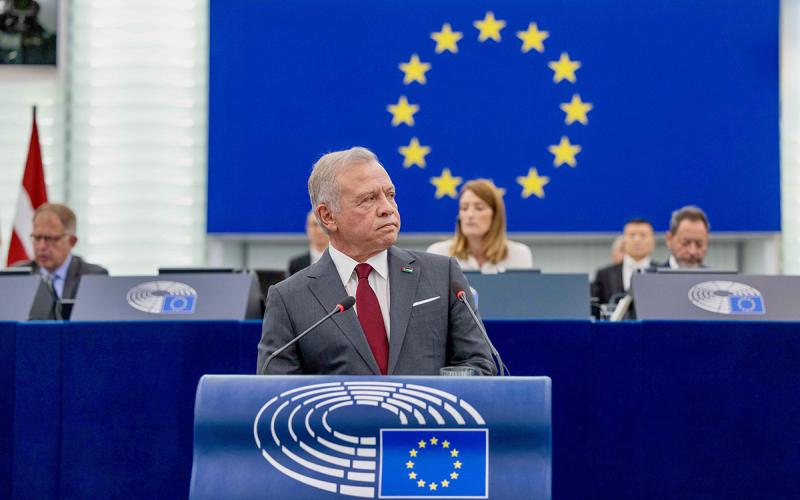“King Abdullah’s Address to EU Parliament, a Masterclass in Diplomacy” - EU official

A senior European official has reaffirmed the EU’s strategic partnership with Jordan, especially given the economic strain caused by the war on Iran and increasing regional instability. The official who preferred not to be identified emphasized that a key element of this partnership is to galvanize private sector investment and stimulate economic momentum through a €3 billion support package.
Despite concerns about the rise of the far right in Europe, the EU official noted that support for Jordan spans the political spectrum, from the far left (due to refugee solidarity and support for the two-state solution) to the far right (due to Jordan’s stabilizing geopolitical role). Thus, there is broad consensus backing aid to Jordan.
Importantly, EU financial aid is governed by the Multiannual Financial Framework (MFF)—a seven-year budget cycle that ensures predictability and resilience regardless of national political shifts.
The EU diplomat described the recently concluded EU-Jordan Strategic Partnership as more than symbolic, backed by a €3 billion support package aimed at leveraging public financing to attract private investment. This blended approach is designed to revitalize Jordan’s economy amid ongoing regional turmoil.
Also highlighted was King Abdullah II’s address to the European Parliament in Strasbourg. It was called “a masterclass in diplomacy.”
Despite regional escalation—particularly the war in Gaza and Israeli strikes on Iran—the King’s decision to proceed with the speech was seen as a bold move. His message, which emphasized international law, tolerance, and the rule of law, resonated across the European political spectrum, even in a deeply polarized Parliament.
“So I think this is good for Jordan to take leadership and to convey this message, which is very constructive and resonates widely. It also emphasizes what brings Arabs and Europeans together,” said the Official. “For example, the culture of tolerance, and he made specific points about the Christian heritage of Jordan because it’s also a way to connect with certain people in the European Parliament.”
The senior EU official also referred to and shared the commitment to the two-state solution. The speech was strong without any concrete requests, and on the sidelines of this address, several bilateral meetings were held that were not focused solely on EU-Jordan relations but also addressed broader issues. The source called it “a very good and consequential statement” and said it is very important to nurture this relationship so that the logical response would be a return visit, with some European leaders expected to visit Jordan soon.
The official noted that Jordan enjoys rare consensus support across Europe’s political divide—left and right—due to its stabilizing role and principled stance on issues like Palestine and refugee hosting.
Regarding Syrian refugees, the EU source warned of worsening conditions and donor fatigue, pointing out that the EU is the only donor maintaining aid at current levels, unlike the U.S. and Japan, which have cut back.
Regarding the upcoming EU-Jordan investment conference in Amman, the EU official called for strategic reforms and greater alignment with large-scale infrastructure projects after acknowledging the underwhelming European turnout at the inaugural EU-Jordan Business Forum held last year in Amman.
Despite last year’s event drawing over 500 participants, the forum saw only two European companies in attendance—a shortfall attributed to poor timing amid the Gaza conflict and lack of compelling incentives. “We did not manage to mobilize European investors. There was no big announcement, no big market opportunity,” the EU official stated.
Looking ahead, the EU source proposed tying the next forum to the inauguration of the multi-billion-dollar Water Conveyor Project. He emphasized the importance of attracting top EU political leaders and presenting a well-defined investment “shopping list” of high-potential sectors like green hydrogen, digital infrastructure, and energy.
It was noted that rebuilding investor confidence amid regional instability is crucial, especially following U.S. aid cuts that have significantly impacted Jordanian civil society. The EU official voiced concern over the impact of U.S. aid cuts, pledging the EU’s continued engagement but warning that Brussels cannot fully compensate for Washington’s retreat.
The diplomatic source also pointed to systemic challenges, including Jordan’s heavy regulatory environment and limited trade outreach in Europe. Regarding Syrian refugees, officials in Brussels have been warning of worsening conditions and donor fatigue. Nevertheless, the EU remains the only donor maintaining aid at current levels.
On UNRWA, concerns were expressed about the agency’s solvency, noting the reduction of support from many EU states, which leaves it vulnerable despite ongoing EU core contributions.













































